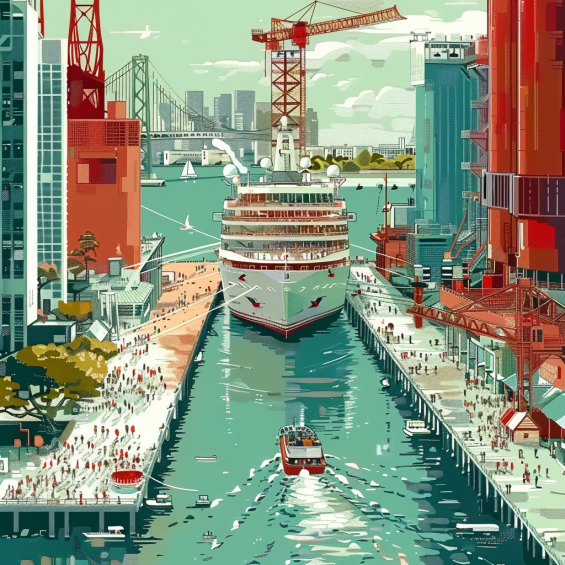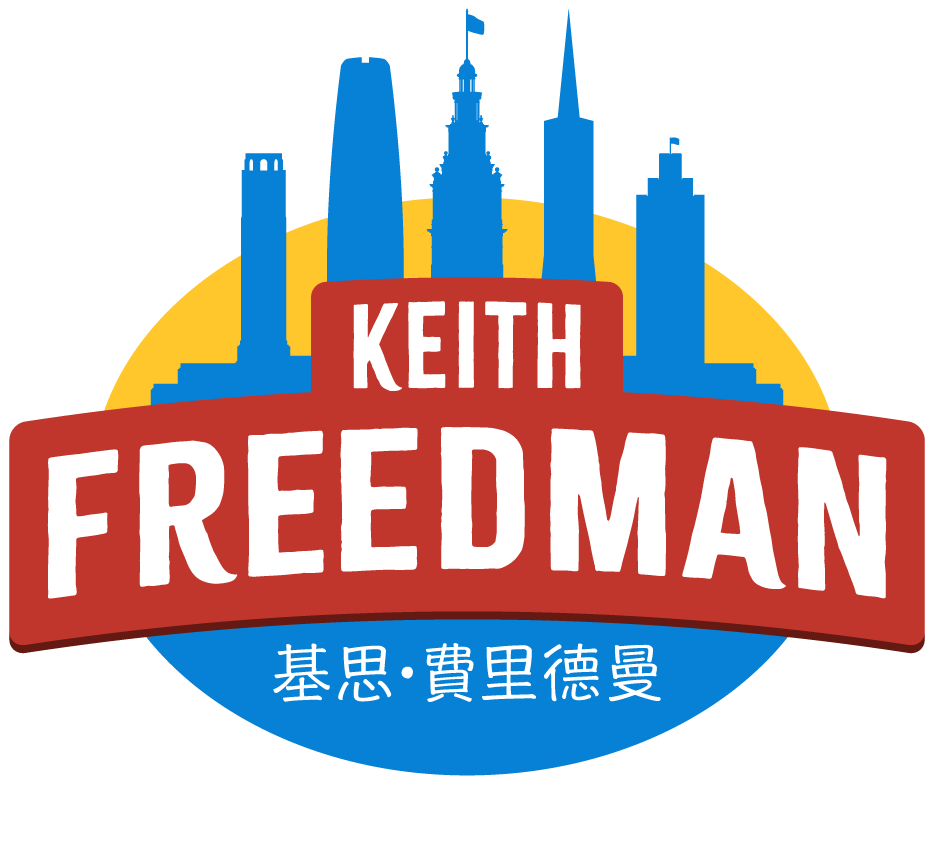
A Rising Tide lifts all Boats
Homes For The Homeless
A Vision for Elevating San Francisco
The Rising Tide Initiative aims to restore San Francisco to its rightful place as one of the world’s greatest cities by addressing the primary issue holding it back: homelessness. Our mission is to elevate all San Franciscans, starting with our unhoused citizens, through comprehensive supportive housing solutions.
The Homelessness Crisis in San Francisco
San Francisco’s homeless population has reached alarming levels. As of the most recent Point-In-Time count, there are over 8,300 individuals experiencing homelessness in The City. This crisis not only affects those without homes but also impacts the broader community and strains public resources and services. The Rising Tide Initiative offers an innovative solution to this pressing issue.
Rapid, Cost-Effective Housing
We propose converting retired cruise ships into permanent housing, securely moored to land. These ships will no longer be sea-worthy and will be transformed into long-term residences. Each stateroom offers a spacious private home with private bathrooms, allowing residents to maintain their dignity and privacy as they rebuild their lives. High end estimates to acquire and retrofit the smaller cruise ship is around $250 million. To contrast this, building 2000 units of affordable housing will cost around $2.3 billion (SEE: thefrisc article) Even more exciting, cruise ships can be move-in ready in 3-6 months, whereas affordable housing takes years to build.
On-Site Supportive Services
High density allows for efficient and cost effective service delivery. The ships will be equipped with a range of on-site wrap-around services, including:
- Medical Facilities: Integrated with local hospitals like SF General to provide comprehensive physical health care. Currently, homeless individuals have a life expectancy of 20 years less than housed individuals, highlighting the urgent need for accessible healthcare.
- Mental Health Services: A combination of on-ship therapists and virtual therapy sessions to meet the diverse mental health needs of residents. Virtual therapy will help bridge the gap caused by the current shortage of therapists in San Francisco, where there is a deficit of over 500 mental health professionals.
- Nutrition: Residents will have access to hot meal services available 24/7, prepared meals, and shared kitchens for those who prefer to cook. Nutritional guidance and meal planning services will also be offered. Proper nutrition is crucial as studies show that 50% of homeless individuals suffer from chronic health conditions exacerbated by poor diet.
- Education: Large common spaces will be converted into classrooms in partnership with City College, providing free educational opportunities, job skills training, and basic life skills courses. Education and job training are vital, given that 75% of the homeless population in San Francisco lack stable employment.
- Safety and Security: The ships will have security personnel focused on de-escalation and ensuring the safety of residents. Residents will agree to a code of conduct similar to a homeowners association (HOA) agreement.
Tailored Care and Rehabilitation
Decks on the ships will be configured to meet the specific needs of different groups:
- Mental Health Support: Dedicated decks for those requiring round-the-clock mental health care. Currently, about 40% of the homeless population suffers from severe mental illness, necessitating specialized care.
- Drug Rehabilitation: Temporary housing on designated decks with specialized drug rehabilitation medical staff before transitioning to long-term staterooms. Approximately 30% of the homeless population in San Francisco struggles with substance abuse disorders.
Pathway to Independence
Our initiative includes a robust reintegration program to help residents transition back to independent living and the workforce:
- Workforce Reintegration: We recognize the barriers to employment for many homeless individuals. To support their return to the workforce, we will offer a new employee subsidy to San Francisco businesses that hire Rising Tide residents. The program will cover 50% of the first year’s total employee cost, incentivizing employers to hire individuals with challenging backgrounds.
- Job Creation: The subsidy is only available for new jobs, ensuring genuine job creation without reducing existing workforce numbers. By creating new employment opportunities, we aim to significantly reduce the unemployment rate among the homeless population, currently estimated at 70%.
Community and Dignity
The Rising Tide Initiative is more than a housing solution; it is a comprehensive plan to restore dignity, provide essential wrap-around services, and create pathways to independence for San Francisco’s unhoused population. By elevating our most vulnerable citizens, we can elevate all of San Francisco, reaffirming our city’s status as a beacon of innovation, compassion, and community.
The Economic Impact
Homelessness costs San Francisco $1.2 billion annually in direct and indirect costs including emergency services, medical care, and lost economic productivity. By investing in the Rising Tide Initiative, we can not only provide humane solutions to homelessness but also significantly reduce these costs, redirecting funds to other vital city services.
Join Us in Building a Brighter Future
Together, we can rise to the challenge and make San Francisco a model city for solving homelessness with dignity and effectiveness. Your vote for this initiative is a vote for a brighter, more inclusive future for all San Franciscans. Let’s work together to make our city a place where everyone has the opportunity to thrive.
Frequently Asked questions
Cruise ships are the fastest and cheapest way to provide a real housing solution that can be implemented in months, not years.
Having a place for people to sleep along with all the wrap-around services people need to rebuild their lives in one location will then allow us to keep our streets clean, fill our empty store fronts, rebuild our reputation and draw tourists, conventions, and businesses back to San Francisco.
When the Rising Tide Cruise Ship housing conversion plan was first conceptualized by Keith, we had about 7700 homeless people with about 4400 unsheltered living on our streets or in vehicles. Since then the number of homeless has grown to 8323. SEE: https://hsh.sfgov.org/about/research-and-reports/pit/
There are various sizes of cruise ships. The plan is to acquire three.
- A smaller ship will house folks who likely need long term medical care. This ship has a capacity for 2000 (more if some rooms are double occupancy by couples or people who wish to co-habitate).
- A medium-sized ship holds about 3500 people;
- A large ship (about the size of one of the medium size Navy ships you’ll see around during fleet week) holds about 5000 people.
NO. We want to provide long term supportive housing that will give people a pathway back to participating as active members of our community.
In line with the recent ballot measure tying receipt of city funding to participation in drug rehabilitation programs, rising tide residents will have to either demonstrate taxpayer money isn’t being spent on drugs or they will have to be an active participant in a rehabilitation program.
Decks on the ships can be cordoned off to provide various levels of care based on an individual’s needs. Some may be implemented like a 30-day in patient “Sandra Bullock” style rehabilitation center, while others may just need more ready access to mental health care or someone similar to an AA/NA sponsor. The ships will have 24/7 medical and mental health professionals to address urgent needs and insure successful outcomes.
Unfortunately, there are some people who may not have a path back to full self-sufficiency. Some decks will be allocated for people who need extra or even round-the-clock care.
Depending on the person’s condition and State Conservatorship guidelines, each will receive a personalized care plan with as much freedom and as many benefits of Rising Tide residency as will benefit them.
